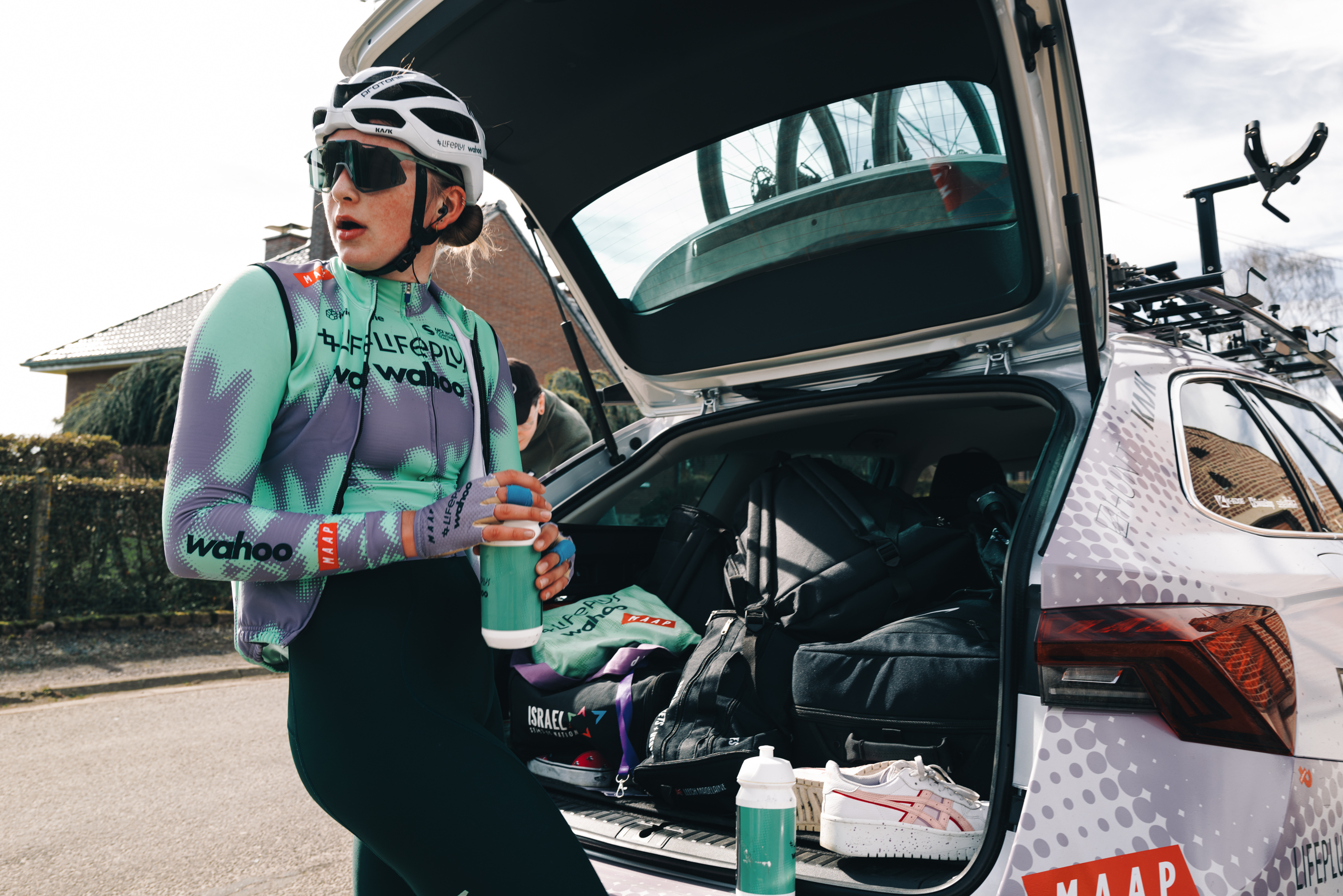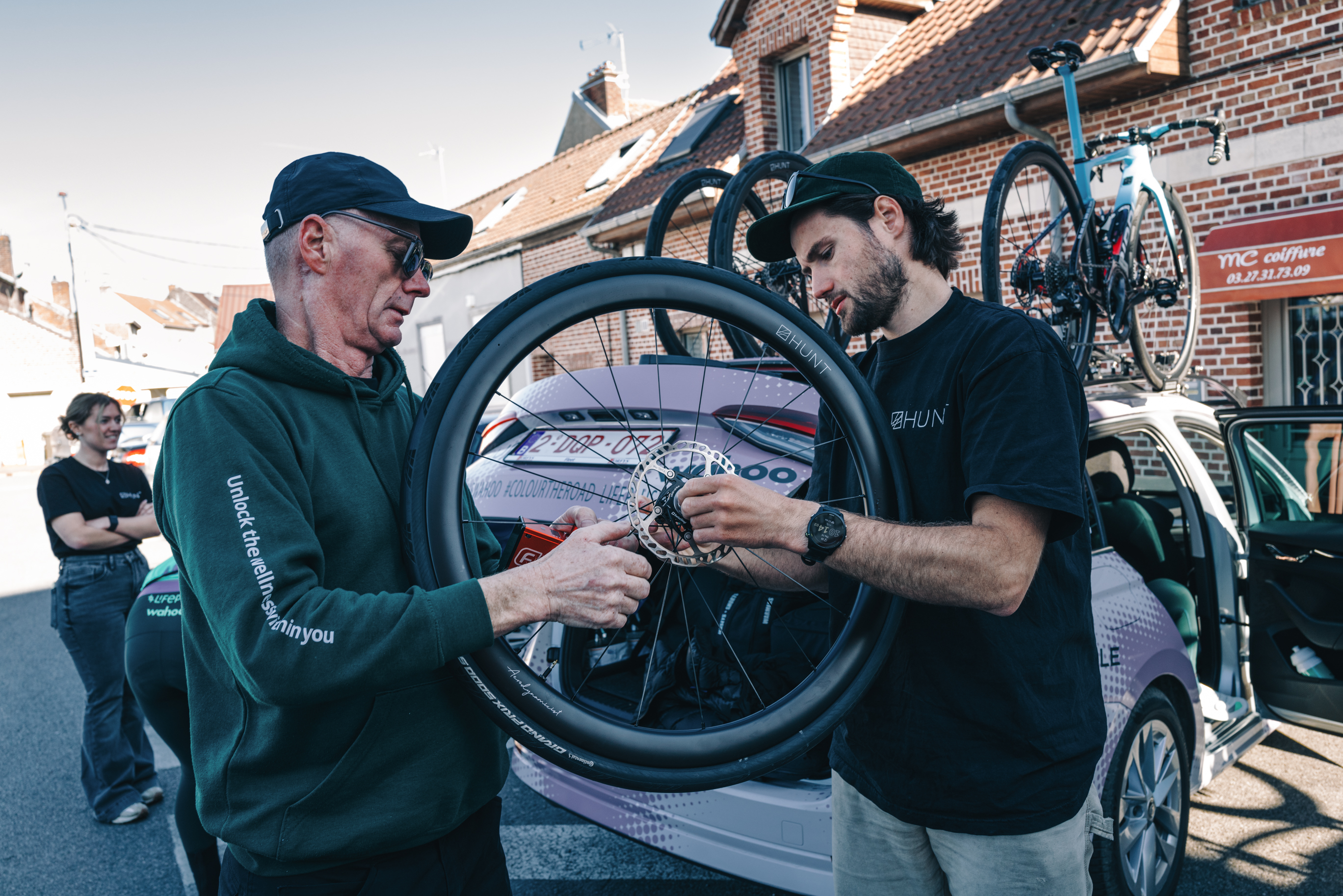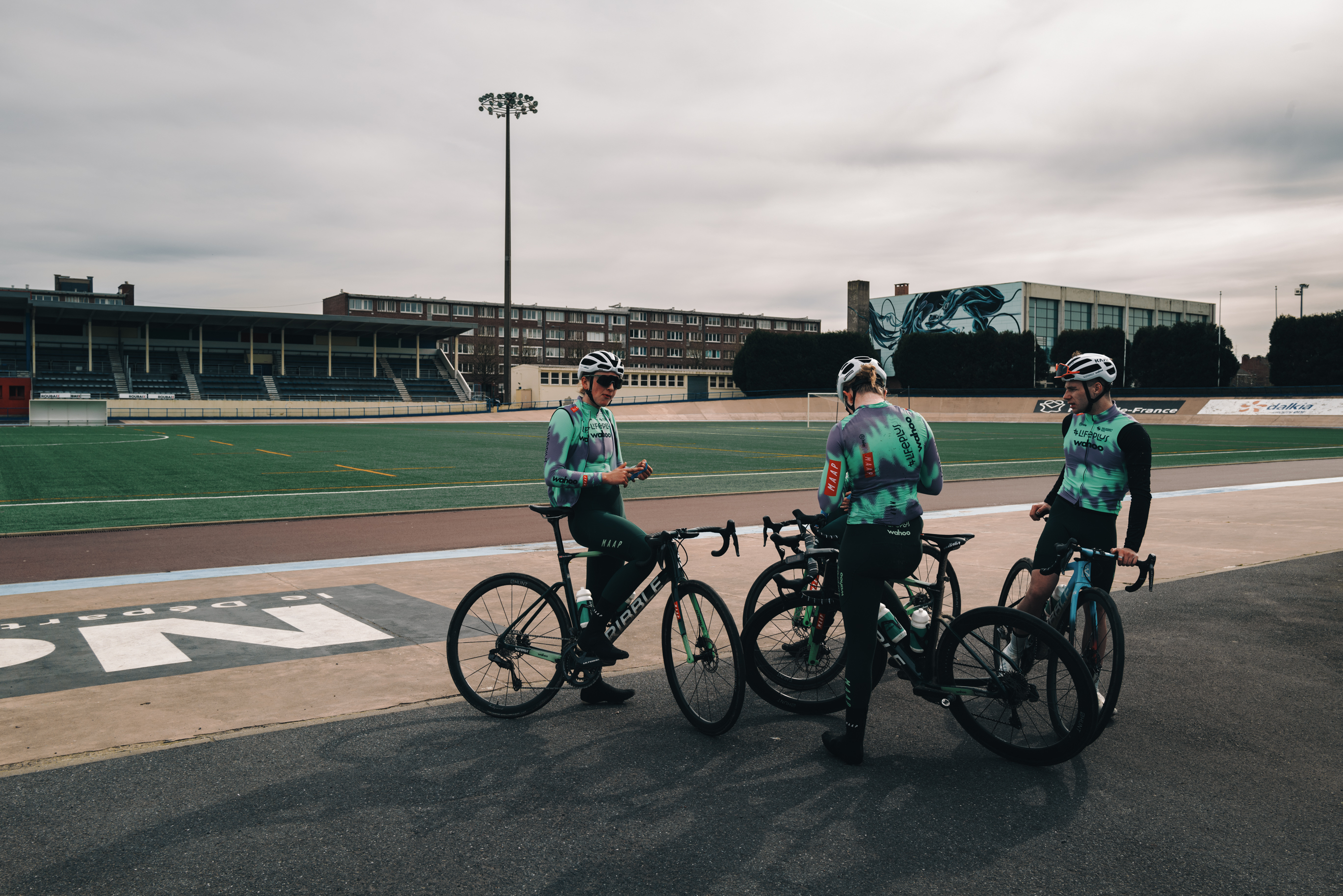'I've never seen the cobbles as bad as this' - Inside one team's Paris-Roubaix recon
Tom Davidson joins British Continental team Lifeplus-Wahoo as they prepare for the most feared race of the season


"Can I have squash in mine?" asks Maddie Leech, holding out her bidon and a bottle of supermarket-brand orange cordial. The time is 10am sharp, and in a packed car park by the post office in the French town of Haveluy, Lifeplus-Wahoo are getting ready for a day across the cobbles.
Three bikes are lined up along a brick wall. One for sprinter Eluned King, one for new signing Kristýna Burlová, and one for Leech, who is wrapping her hands in blue tape. The 20-year-old can spin tales of the brutality of Paris-Roubaix. When she made her debut last year, she didn't reach the end of the first stretch of cobbles.
"There was a crash a few kilometres out from the first sector," says Leech. "I didn't actually crash, I just stood there, and then one of the motorbikes in the race came into the back of us and pushed three or four of us into the crash.
"I got back on. I was completely by myself. Then I made it 200 or 300 metres onto the first cobbled sector, and my spare bike broke."
There, Leech waited at the roadside for 10 minutes, before the broom wagon swept her up. "I was sat in the broom wagon for four hours, and I cried for four hours," she remembers. "It was because of the frustration, and because my legs really hurt. They were black and blue for three or four weeks after that."
Today, however, spirits are high. The sun is shining, and the trio have already paid a visit to the café across the road. With double-figure degrees forecast for the rest of the day, they start to question if they've put on too many layers.
I ready my place in the passenger seat of the second team car. My driver is Paddy Brown, a design engineer at Lifeplus-Wahoo's wheel sponsor, Hunt, whose chauffeur duties have come as a last-minute surprise; that role was sprung on him by the team's sports director, Arthur Rémond, a former swimmer, who has turned up in bib shorts and a jersey, and saddled up to join his riders on the recon.
The latest race content, interviews, features, reviews and expert buying guides, direct to your inbox!
"We're going to break the little guy," grins King, clad in mint green and purple, rolling slowly around the car park. As she turns her front wheel, the tyre morphs on the tarmac, and squeaks like wipers on a dry windscreen, so low is the pressure.

The route for the day is simple; it's 100km long and traces the race, counting each and every cobbled sector, but skipping the start loop in Denain. We're told the car has a splash shield fitted to protect its underside. As we hit the first cobbled sector and see its wicked camber, we cross our fingers that that's true.
The riders drift ahead and out of sight. Brown wrestles with the steering wheel, and the car fills with a dull, rattling noise. Suddenly, there's a loud bang. A din as piercing as a gunshot. We both inhale sharply through our teeth. That'll be the splash shield working, we figure.
For years, I've watched Paris-Roubaix on TV, and dreamed of going out to ride the cobbles myself. Now, in the face of jagged rocks, falling away into murky standing water, the idea doesn't seem so appealing. The riders approach a pond-like puddle, so deep it touches the bumper of the other team car in front, and carry their momentum through it.
"That was scary," says Leech when we arrive at our first stop shortly afterwards. "You've just got to hope there's nothing underneath."
The aim of the day is fine-tuning the tech. That's why Hunt is along for the ride, and that’s why regular stops are planned. The riders rolled out on deep, aero rims with tyre pressures of around 46psi (3.2 bar) - "knowing it's going to be over pressure," says Brown.
"Our riders are the ultimate product testers," Hunt's design engineer tells me. "You can't make most people go ride 100km on the cobbles. But if you give wheels to a pro to race a Classics season on, that's testing you can't get anywhere else.
"They're going to ride thousands of kilometres, and way faster. And if they need to just ride through a hole, they're going to ride through a hole in a way that people who pay for stuff just won't." I think back to the puddle. "It's about having a relationship, and getting feedback," Brown continues. "That's something that's always pushed us to be better."
There's little respite between the sectors, and after just a handful, the feedback starts to flow. The Lifeplus-Wahoo trio drop to even lower tyre pressures, as expected, and Leech and Burlová swap to shallower rims, for a more comfortable feel.
True comfort, though, is an impossible dream on the disused farm tracks of northern France. Not even cars use these roads, reserved instead for tractors and intrepid cyclists.
New work zone : Haveluy 🙈😁 pic.twitter.com/2PIKKEJEq2March 18, 2024
As we trundle through the sectors, Brown tries to avoid the fearsome camber by driving with half the car's chassis over the mud at the roadside. A glance out at the upturned fields shows patches of water, the remains of recent downpours, which have brought sprouts of grass, as well as plastic bottles and shards of brick, to the surface. The riders ahead dodge a large cowpat, and one swerves to avoid a wandering chicken.
Like Leech, King is preparing for her second attempt at Paris-Roubaix, a race that brings back sore memories for her, too. When she first took the start line in 2022, she came down before the first cobbled sector, and broke her scaphoid bone.
"I had quite a bit of pain in my wrist and my ribs," the 21-year-old recalls. "When I got to the velodrome, as soon as I crossed the line, everything hurt. I was in quite a bit of pain when I was riding, but I made it to the velodrome." She smiles. "Not within the time limit, but I made it."
Now, she's out to have fun. The night before the recon, King's team-mates pressured her into having a crack at the Strava QOM on the Carrefour de l'Arbre, and as she approaches the 2km sector – one of the most famous in the race – she winds up a big gear, rounds a house on the corner, and disappears. Three minutes is the golden number. When we catch up in the car, it's clear from the look on her face that she didn't manage it. Oh well, she shrugs.
The final few sectors are the easiest in the race, but come after four bone-shaking hours. Saddled-up sports director Rémond appears the most out of breath as the velodrome draws closer. When they finally make it to Roubaix, King smiles down at her cycling computer. "I averaged over 30km/h," she says proudly. The group then poses for a photo.

Burlová prods at the blisters forming on her hands. For the Czech rider, who has never raced Paris-Roubaix, this was her second recon in as many weeks. Her first was rain-soaked. Does she now feel prepared for any conditions on race day? "I hope so," she says, but having heard Leech's and King's stories, she admits she's "a bit scared about it". "Especially the fight before the first cobbled section," she adds. "It often gets nervous there."
As the trio heads to the showers, I turn to Yves, the team's seasoned mechanic. He holds a serious regard. "I've never seen the cobbles as bad as this year," he says.
The Belgian has been working in cycling for 25 years, "since before you were born," he tells me. (I'd have been two). "The tracks are particularly bad this year because of the wet weather", he says, "and the tractors, too". He then returns to his duties, wheeling away one of the bikes with his calloused hands, craggy like a Rodin sculpture.
We wave goodbye to the team, and head back to the Carrefour de l'Arbre, so Hunt can take some product shots. There, I speak to a dog walker, Stéphane, who lives in the next village over, and works as a photographer for the local paper. Now 50, he has followed Paris-Roubaix for over 40 years, and has worked on the race from the back of a motorbike.
"The rain has been very bad here," he says, concurring with what Yves told me. "For the last four weeks it has been wet and cold. When the mud below the cobbles freezes, it pushes them up to the surface and out of place." He points back over his shoulder. "The road just down there is completely ruined… and on the Mons-en-Pévèle sector."
Between now and 6 April, many of the worst stretches should be repaired, thanks to the tireless work of local groups, like the Amis de Paris-Roubaix and a nearby farming school. "But they'll never be able to fix all these sectors," says Stéphane. He fears there will be bad crashes. That danger becomes clear the same afternoon when, at the local GP de Denain, a handful of riders skid on thick mud and pile up on the cobbles.
The following morning, torrential rain batters the van on the drive to the train station. My mind goes to that crash, and the state of the roads I saw. Those rutted beasts. Just one rogue cobble can spell the end of a rider's race, and maybe even their season thereafter. That's why preparation is key, both for titans like SD Worx-Protime and minnows like Lifeplus-Wahoo. They'll fuss about the broken bones later.

Tom joined Cycling Weekly as a news and features writer in the summer of 2022, having previously contributed as a freelancer. He is fluent in French and Spanish, and holds a master's degree in International Journalism. Since 2020, he has been the host of The TT Podcast, offering race analysis and rider interviews.
An enthusiastic cyclist himself, Tom likes it most when the road goes uphill, and actively seeks out double-figure gradients on his rides. His best result is 28th in a hill-climb competition, albeit out of 40 entrants.